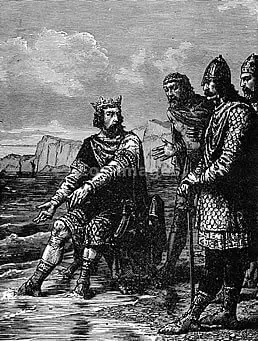No one is so powerful that they can stop the march of time.
Time and tide wait for no man
What's the meaning of the phrase 'Time and tide wait for no man'?
What's the origin of the phrase 'Time and tide wait for no man'?
The origin is uncertain, although it’s clear that the phrase is ancient and that it pre-dates modern English. The earliest known record is from St. Marher, 1225:
“And te tide and te time þat tu iboren were, schal beon iblescet.”
A version in modern English – “the tide abides for, tarrieth for no man, stays no man, tide nor time tarrieth no man” evolved into the present day version.
The notion of ‘tide’ being beyond man’s control brings up images of the King Canute story. He demonstrated to his courtiers the limits of a king’s power by failing to make the sea obey his command. That literal interpretation of ‘tide’ in ‘time and tide’ is what is now usually understood, but wasn’t what was meant in the original version of the expression. ‘Tide’ didn’t refer to the contemporary meaning of the word, that is, the rising and falling of the sea, but to a period of time. When this phrase was coined tide meant a season, or a time, or a while. The word is still with us in that sense in ‘good tidings’, which refers to a good event or occasion and Whitsuntide, noontide etc.
See also: the List of Proverbs.
Browse more Phrases
About the Author

Phrases & Meanings
A-Z
A B C D E F G H I J K L M N O P Q R S T UV W XYZ
Categories
American Animals Australian Bible Body Colour Conflict Death Devil Dogs Emotions Euphemism Family Fashion Food French Horses ‘Jack’ Luck Money Military Music Names Nature Nautical Numbers Politics Religion Shakespeare Stupidity Entertainment Weather Women Work
How did we do?
Have you spotted something that needs updated on this page? We review all feedback we receive to ensure that we provide the most accurate and up to date information on phrases.
